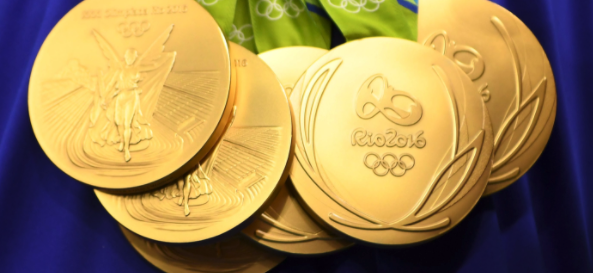Most Americans consider Olympic athletes role models. But after this year’s Summer Games, several of them are being singled out as potential tax cheats.
The IRS is coming after American Olympians for paying “victory taxes” by claiming their medals and prize money as income — even though they’re exempt under international treaties.
And it looks like U.S. officials are determined to collect the money from hundreds of winners, including dozens who pocketed at least $10,000 each for first-place finishes. The U.S., which declined to send a delegation to the 1936 Games in Nazi Germany, has since turned the Summer Olympics into an unparalleled showcase for American power.
But it’s difficult to find another time when the U.S. government has so strongly discouraged its citizens from competing in international sporting events — or placed such tremendous tax levy burdens on them if they do succeed. It’s the cost of winning gold, but also of living in the land of the free.

The average Olympic athlete has little disposable income
So the government’s campaign is taking a devastating toll. Highly trained and motivated individuals are dropping out of sports for fear they won’t be able to afford college or that their careers will be derailed before they even get started.
Eli Bremer learned this the hard way. He was swimming his heart out at the U.S. championships in 2011 when he turned 16 — just one week shy of the age at which he would have qualified for this year’s games in Rio de Janeiro as an Olympian.
But Bremer couldn’t compete without funding — and his family simply didn’t have enough cash to keep him afloat much longer, let alone help fund a final swim meet. “I came incredibly close,” Bremer told Yahoo Finance, “but I decided to stop competing.”
Bremer’s swim coach, Mel Lawrence, says the system is broken. “We have so many talented kids who never get to realize their potential because they never get a shot at it,” Lawrence said. “It’s insane in this day and age that you can’t compete for your country without paying money out of your own pocket.”
Athletes generally have to pay taxes on Olympic medals if they’re American citizens and win them competing for their country, according to Robert Wood, an international IRS tax expert at Boston College Law School.

The federal income tax exclusion is designed to exempt prize money received by non-citizens — a measure that was added with China’s participation in mind. But athletes can still be taxed under “an anti-double taxation provision” designed to prevent U.S. taxpayers from being taxed twice — either in America or overseas — for any given type of income, such as prize money earned on a foreign team, Wood said. This is where things get complicated in Athens.
One way or another
U.S. Olympians are supposed to pay off Uncle Sam’s tax bill by the time they’re done in the cradle of democracy — whether that means coughing up their actual winnings or submitting paperwork that shows they have no taxable income. (This is what athletes who don’t compete for American teams typically do.) But not everyone does this. In fact, some high-profile U.S. athletes have yet to file any tax returns at all, according to records obtained by NBC News under the Freedom of Information Act.
Gymnast Carly Patterson filed her return on June 2 — three days before she was set to accept her gold medal during the opening ceremonies of the 2004 Games in Athens — after a reporter began
“It seems kind of crazy,” said Steven Locke, a sports lawyer at Goodwin Procter who represents Olympic medalists and other athletes. “These athletes are risking life and limb and years of their lives to compete in these games.”

Athletes’ prize money is already taxed as ordinary income by the countries where they win gold medals, silverware or cash prizes for their performances at the Summer and Winter Olympics. And the U.S., which refuses to join the rest of the developed world in signing treaties that recognize athletes as amateurs, does not levy taxes on Olympic winnings from its own games. (That’s why some top American Olympians train for years with no pay.)
But a quirk in federal law threatens to hit gold medalists with a hefty tax bill — even if they never set foot on U.S. soil after their victories at the Summer Games this month. Under long-standing IRS rules, all prizes and awards are considered taxable income, whether they come from athletic competitions or game shows like “The Price Is Right.” Gold medal winners could be on the hook for at least $9,900 for finishing first in the 100-meter dash or $5,940 for winning a silver medal in women’s soccer.
For every $1 American Olympians win in London
They could end up owing Uncle Sam as much as 43 cents of tax liability. But some athletes might not even be aware that these taxes exist — let alone have enough cash on hand to cover them after traveling to compete at the Olympic Games.
According to an employee of the U.S. Treasury Department’s tax agency, “a lot of people aren’t really sure about it.” The IRS even declined comment when asked whether it planned to hire special agents to track down (or threaten) Americans who didn’t pay their victory taxes on time. Under normal circumstances, the agency doesn’t issue any warnings to Olympic athletes before their victories are due.

And if they don’t pay up, it’s unclear whether IRS agents would chase down taxpayer delinquents in countries like Britain and France or leaders of developing nations with unstable tax systems — countries where many American Olympians actually train for years. “They’re not going after anybody,” said Chicago-based international tax expert Robert Wood, who teaches at Boston College Law School.
A spokesman for U.S. Treasury Secretary declined to say anything when asked about victory taxes in a telephone interview last week. When reached by NBC News Thursday morning, the director of the Treasury Department’s Olympic gold medal task force — which is to say there is no such thing — said, “I don’t have any comment at this time.”
Victory taxes are hardly a new phenomenon
They’ve been on the books for 93 years and were actually created to help fund World War I. But more recent changes in federal tax law have sharply extended these levies’ reach while leaving their enforcement largely up to foreign governments.

“There’s really nothing U.S. officials can do,” Locke said, speaking of gold medalists who might not be aware that they’re responsible for paying taxes on top of income taxes already withheld by countries where they win their medals (typically up to 25 percent). Many athletes from poor or developing nations would have had little choice but to leave home if they wanted to become rich and famous, Locke said.
The uncertainty isn’t limited to athletics. American Olympians in all sports are supposed to pay taxes on any prizes won by bringing home Olympic medals, ribbons or trophies (although an exception is made for prizes that aren’t worth more than $100). And athletes who return without winning a medal might also owe some hefty penalties if they didn’t deduct the cost of getting to the games when filing their previous year’s tax returns with the IRS.
However, most Americans upset about high federal income taxes would probably see little humor in learning how much other countries will tax them for winning gold in front of home crowds while wearing their country’s colors — even before they’ve left.
